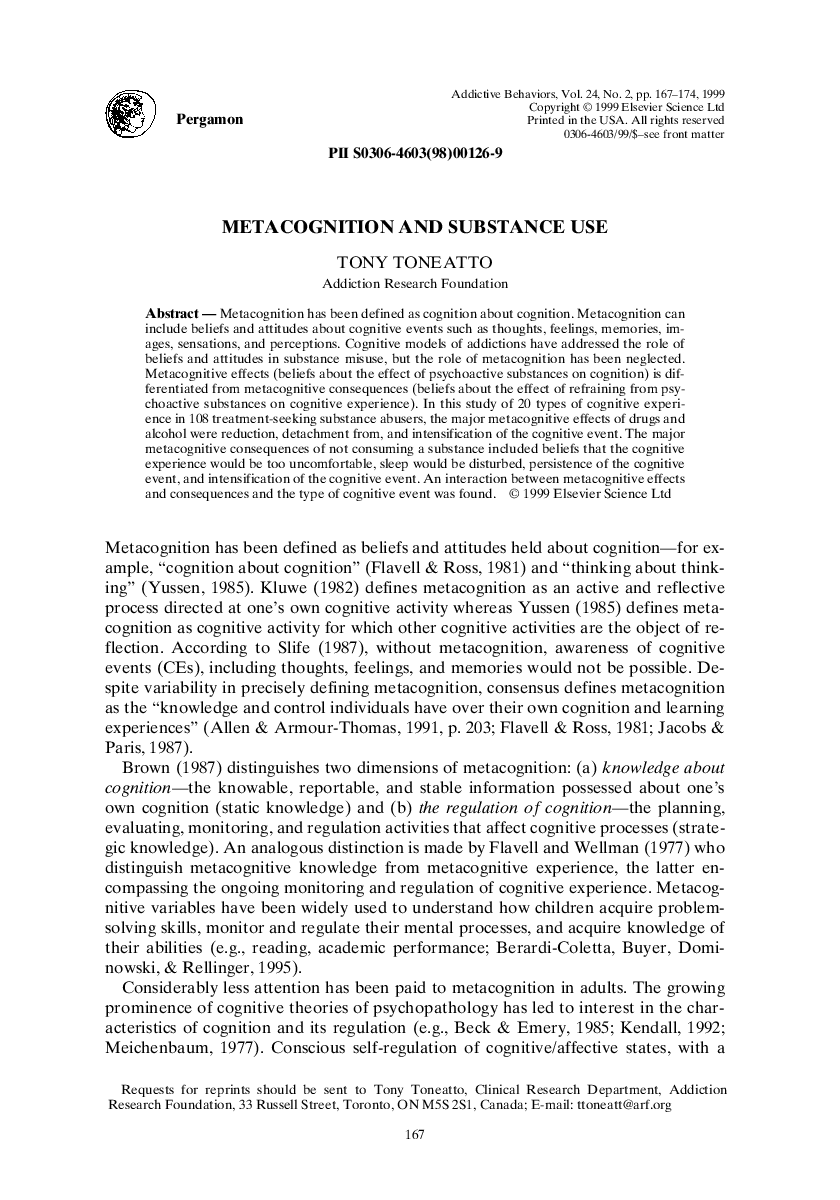| Article ID | Journal | Published Year | Pages | File Type |
|---|---|---|---|---|
| 12163873 | Addictive Behaviors | 1999 | 8 Pages |
Abstract
Metacognition has been defined as cognition about cognition. Metacognition can include beliefs and attitudes about cognitive events such as thoughts, feelings, memories, images, sensations, and perceptions. Cognitive models of addictions have addressed the role of beliefs and attitudes in substance misuse, but the role of metacognition has been neglected. Metacognitive effects (beliefs about the effect of psychoactive substances on cognition) is differentiated from metacognitive consequences (beliefs about the effect of refraining from psychoactive substances on cognitive experience). In this study of 20 types of cognitive experience in 108 treatment-seeking substance abusers, the major metacognitive effects of drugs and alcohol were reduction, detachment from, and intensification of the cognitive event. The major metacognitive consequences of not consuming a substance included beliefs that the cognitive experience would be too uncomfortable, sleep would be disturbed, persistence of the cognitive event, and intensification of the cognitive event. An interaction between metacognitive effects and consequences and the type of cognitive event was found.
Metacognition has been defined as beliefs and attitudes held about cognition—for example, “cognition about cognition” (Flavell & Ross, 1981) and “thinking about thinking” (Yussen, 1985). Kluwe (1982) defines metacognition as an active and reflective process directed at one’s own cognitive activity whereas Yussen (1985) defines metacognition as cognitive activity for which other cognitive activities are the object of reflection. According to Slife (1987), without metacognition, awareness of cognitive events (CEs), including thoughts, feelings, and memories would not be possible. Despite variability in precisely defining metacognition, consensus defines metacognition as the “knowledge and control individuals have over their own cognition and learning experiences” (Allen & Armour-Thomas, 1991, p. 203; Flavell & Ross 1981 and Jacobs & Paris 1987).
Brown (1987) distinguishes two dimensions of metacognition: (a) knowledge about cognition—the knowable, reportable, and stable information possessed about one’s own cognition (static knowledge) and (b) the regulation of cognition—the planning, evaluating, monitoring, and regulation activities that affect cognitive processes (strategic knowledge). An analogous distinction is made by Flavell and Wellman (1977) who distinguish metacognitive knowledge from metacognitive experience, the latter encompassing the ongoing monitoring and regulation of cognitive experience. Metacognitive variables have been widely used to understand how children acquire problem-solving skills, monitor and regulate their mental processes, and acquire knowledge of their abilities (e.g., reading, academic performance; Berardi-Coletta, Buyer, Dominowski, & Rellinger, 1995).
Considerably less attention has been paid to metacognition in adults. The growing prominence of cognitive theories of psychopathology has led to interest in the characteristics of cognition and its regulation (e.g., Beck & Emery 1985, Kendall 1992 and Meichenbaum 1977). Conscious self-regulation of cognitive/affective states, with a particular emphasis on how self-talk/internal dialogue can alter cognitive states, has been studied by a number of psychologists (e.g., Beck & Emery 1985, Ellis 1986 and Meichenbaum 1977).
Metacognition may have particular relevance in cognitive analyses of substance abuse and dependence. From a metacognitive standpoint, substance use is an effective means of rapidly modifying CEs such as feelings, thoughts, or memories judged or perceived to be aversive and/or undesirable. Psychoactive substances may modify CEs directly (e.g., induce relaxation, reduce aversiveness, escape painful cognitions, reduce awareness) or indirectly by modifying beliefs and attitudes about aversive CEs (e.g., feeling detached or “numbness,” suppress appraisals). Such cognitive modifications may be potent positive and negative reinforcers of drinking behavior. Over time, the substance abuser may not only acquire a wide body of knowledge, expectancies, and beliefs of the effects of psychoactive substances on cognition but also knowledge of the cognitive consequences should substance use not occur. Not consuming a psychoactive substance when desired may come to be associated with specific beliefs and attitudes about the impact on CEs.
The present study is an exploratory investigation of the metacognitive characteristics of a sample of treatment-seeking substance abusers. Two types of metacognitive knowledge were studied: metacognitive effects of substance use and metacognitive consequences of refraining from substance use. Metacognitive effects are beliefs about the impact of drugs and alcohol on cognition. Metacognitive consequences are beliefs about the cognitive effects of continued experience of an unpleasant and undesirable CE.
Keywords
Related Topics
Life Sciences
Neuroscience
Behavioral Neuroscience
Authors
Tony Toneatto,
